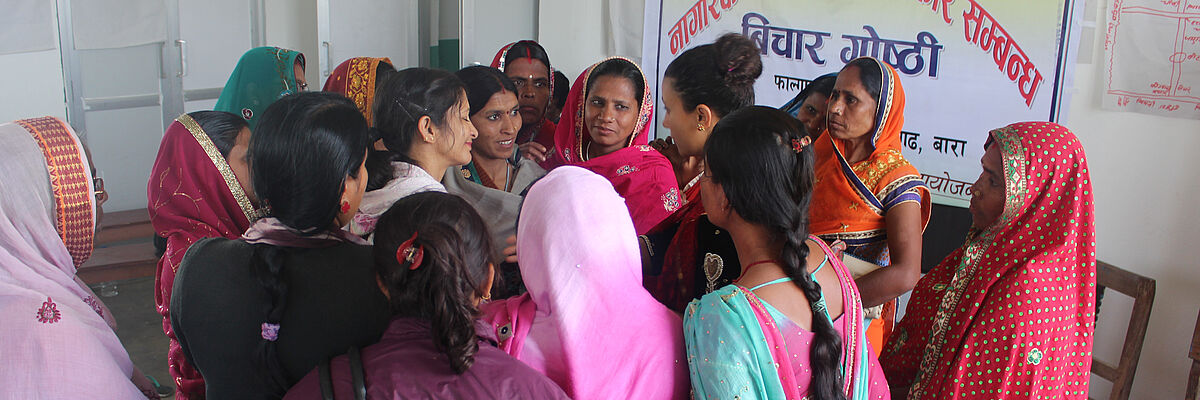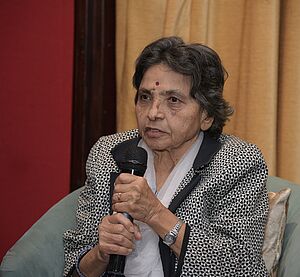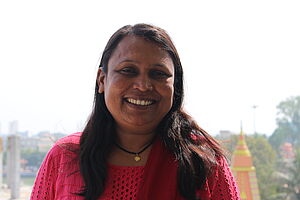Let's talk about Gender Justice: A conversation about successes and challenges in Nepal.

FES Nepal talked to Prof. Meena Acharya, one of the most prominent voices in the Nepalese women’s movement, and to the social worker Pramila Kumari Singh about gender justice in today's Nepal.
FES Nepal: There have been lot of claims that gender justice in Nepal is moving forward. Certainly, there has been progress recently, but overall there are still a lot of challenges. Where does gender justice stand at present?
Meena Acharya:Since I have not been involved in comprehensive evaluations of the post-2015 developments, it is hard to say with confidence anything about progress in substantive equality. What can be said is that the government has initiated several measures to improve the environment for substantive equality. For example, in terms of school enrollment the Beijing+ 25 National Review from 2019 does show some improvement. Similarly, women's nominal ownership of land and property has increased from 20 percent in 2014 to 26 percent in 2019. But what that means in terms of actual empowerment and substantive economic equality is yet to be assessed. Especially as there is a substantial rebate on land registration taxes for women. Similarly, no comprehensive policy or programs are being implemented to strengthen girls' access to parental property. This exists only on paper.
FES Nepal: Pramila, how do you see the situation?
Pramila Kumari Singh:In Nepal, we have many good policies striving towards gender justice. However, there is a severe lack of implementation. I feel we have binding provisions in our constitution, but they seem to be limited only in letters. Being a patriarchal society, discrimination against girls and women starts right from the time a child is conceived. There are still families who do not think twice before aborting a girl child. The situation in Terai (Southern plains of the country) is even worse. Women face tremendous pressure from their own families including their husbands. It seems gender equality in my region is more like “Ekadesh ko katha” (once upon a time story).

FES Nepal: What are the three greatest challenges for achieving gender equality in Nepal?
Meena Acharya:One of the major challenges I see is people's representatives themselves lack a long-term perspective on gender equality issues. Many female representatives lack the technical capacity to fulfill their roles effectively. Moreover, women’s contribution to care and domestic work has not yet been recognized in the formal economy which remains a major barrier to women’s entry into the labour market.
In addition to the sundry benefits, the institutional mechanisms of the state are being strengthened in favour of woman such as access to 'legal services', and appointment of women in the Judicial committee' of the local governments. These certainly are the positive steps but once again we do not know their effectiveness because 'expertise' in this filed is still missing.

FES Nepal: Would you agree with this top three?
Pramila Kumari Singh: For sure one of the major challenges in terms of gender equality is the lack of meaningful participation of women at all levels of the state. Another challenge is that most of the women in all sectors seldom reach to the leadership positions. Besides, the laws and policies laid out in the constitution are not properly implemented. To sum up, until and unless women do not have opportunity to take the floor (aashan), express themselves (bhashan) and be a part of decision-making position (shashan), gender equality cannot be achieved.
FES Nepal: In terms of way forward, what do you suggest to overcome these challenges? Any ideas for a magic cure?
Meena Acharya: I think we have to improve women’s access to resources and qualitative jobs, technical education and training. It is therefore necessary to assess actual qualitative improvement in girl’s substantive access to technical education.
As I mentioned above, since domestic and care work does not yet have a place in the formal economy, there have not been many initiatives to record, reduce and redistribute it. Policy makers need to initiate measures to reduce and promote sharing of unpaid housework and care activities.
Women and Children Section have been established in 753 local government units to replace the district level women’s office. These units should bring into effect a robust monitoring system with a gender responsive data and evidence base.
Pramila Kumari Singh:There are many things we need to work on. To start, in Terai, girls and women still do not have easy access to educational opportunities. Girls should be encouraged to pursue formal education. The access to informal education should be strengthened for those women, who missed out formal education. Moreover, government should come up with programs that help women to enhance their skills and opportunities for income generation. Alongside, it is important to create equal spaces in all sectors of employment.
FES Nepal: Thank you very much for the interview and for your commitment to gender equality in Nepal!
Friedrich-Ebert-Stiftung Nepal
Sanepa, Ward No. 2, Lalitpur
P. O. Box: 11840
Kathmandu
Nepal





